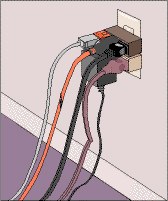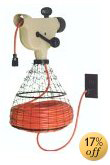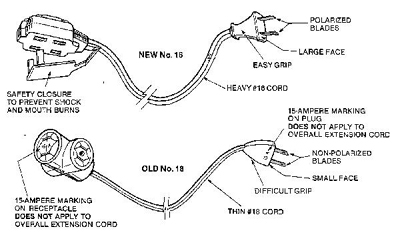Extension Cords Far More Dangerous Than Many Realize: Three Important Reasons to Check Your Cords
by SixWise.com
Most people don't give much thought to the extension cords running under their couches, connecting lamps to faraway sockets or allowing five plugs to fit into one electrical outlet -- until something goes wrong. Please don't make that mistake!
Every year, an estimated 4,000 injuries are treated in hospital emergency rooms, according to the U.S. Consumer Product Safety Commission (CPSC), and 13 percent of those injuries involve young children aged 5 years or less.
Three Major Extension Cord Risks
1. Tripping
How many extension cords are running across your floors, in heavily trafficked, common areas, right now? This accident waiting to happen is the reason why, according to the CPSC, about half of extension-cord-related injuries involve fractures, lacerations, contusions, or sprains from people tripping over extension cords. The elderly are most at risk, as a fall can easily break bones or result in the need for surgery.
The solution: Place extension cords with extreme care, in areas that are not normally walked over. Run cords along baseboards or walls or thread them behind tables or other furniture where they are out of the way. (DO NOT put them under rugs or heavy furniture, or behind radiators or heaters, as this is a fire hazard)
2. Fires
The CPSC estimates that extension cords cause about 3,300 residential fires each year, killing 50 people and injuring about 270 others. The most frequent causes of extension cord fires?
- Short circuits
- Using old, damaged cords
- Overloading cords, which leads to overheating
- Misuse
The solution: Delaware's Assistant State Fire Marshal Richard Ward said homeowners can reduce their risk of extension cord fires by investing in heavier gauge extension cords and avoiding "bargain cords."

Overloading extension cords can cause deadly fires. Play it safe and don't try to plug in " just one more." |
"You get what you pay for," Ward said. "If you pay more money, you're going to get a better extension cord." Other tips include:
- Replace cords that are cracked or frayed.
- Don't overload cords or sockets.
- Don't run cords under rugs or near heaters or radiators.
- Only use exterior extension cords for outside use. Firefighters in Phoenix, AZ said they see several fires each year caused solely by people using interior extension cords outside.
- Pay attention to cord quality and purpose -- don't use a light-duty extension cord for a job that really needs a heavy-duty variety, such as air conditioners or freezers.
- Feel the temperature of the cords when they are in use. If they are hot to the touch, unplug them immediately. Replace the extension cord with one that has No. 16 or heavier gauge wire (the lower the number, the heavier the wire and the more electrical current the cord can safely carry).
3. Electrical Burns
Electrical burns to the mouth accounted for half the extension-cord-related injuries to young children, according to the CPSC. They reported one incident in which a 15-month-old girl put an extension cord in her mouth and suffered an electrical burn that required surgery.
The solution: Keep all extension cords out of the reach of children. Plugs, outlets and cords can be irresistible to young children who don't realize their dangers.
Play it safe and avoid using them if you have small children, or ensure that your child cannot get access to the cord. Some of the worst places to put them are dangling over counters or tabletops where they can be pulled down. If you do use one, be sure it has a safety closure to cover any unused outlets.
 Winding and unwinding outdoor extension cords can be a major hassle ... and the tangled cords can be a major risk. This outdoor extension cord "Wonder Winder" ends the hassle for good, making winding and unwinding your extension cord as snap! A great gift -- whether to a loved one or yourself. Winding and unwinding outdoor extension cords can be a major hassle ... and the tangled cords can be a major risk. This outdoor extension cord "Wonder Winder" ends the hassle for good, making winding and unwinding your extension cord as snap! A great gift -- whether to a loved one or yourself.
Read More Now! |
Other Tips For Safe Extension Cord Use
Extension cords are handy tools and necessities in many homes, so follow these other tips to help you use extension cords in the safest manner:
- Make sure new cords are listed by a recognized national testing laboratory
- Only use extension cords when they're absolutely necessary
- Use polarized extension cords with polarized appliances
- Don't leave prongs exposed, even partly, when the cord is in use
- Pull the plug, not the cord, when disconnecting it from the socket
- Special "angle extension cords" can be used where furniture or beds may push against the plug
- Don't use staples or nails to attach extension cords to any surface
- Don't exceed the total wattage listed on the cord by plugging in too many appliances
- Try not to use them for long-term purposes

The extension cord No. 16 on top shows a safe version
with polarized blades and a safety closure. The older extension
cord on the bottom has non-polarized blades and a thin cord that
could be a fire hazard. |
Sources
Extension Cords Fact Sheet
Household Extension Cords Can Cause Fires
Delaware Online